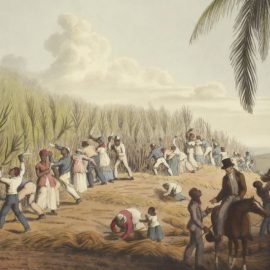
How should we address social harms such as war and poverty? Do you sense a call to take on such issues in your community or the world?
The 2023 book Life Worth Living urges you to adopt a philosophy of life. Oftentimes, such personal life philosophies entail an obligation to minimize social harms such as crime and bigotry. The authors share approaches from Mary Wollstonecraft, James Baldwin, and Confucius.
Read more to draw inspiration from these thought leaders.
Minimizing Social Harms
Volf, Croasmun, and McAnnally-Linz explain that some thinkers believe you’re obligated to minimize social harms such as war, poverty, and racism. One way you can minimize social harms is via “effective altruism,” a utilitarian movement centered around exercising extreme generosity to solve high-priority problems (for example, you might devote your spare time to the AI alignment problem—ensuring AI only benefits and never harms humanity). While this provides direct aid to people in hardship, it may not address the root cause of their suffering—social injustices. If your life philosophy includes working toward social justice, the authors describe three different approaches that may inspire you.
Approach #1: Mary Wollstonecraft
First, the 18th-century English writer Mary Wollstonecraft believed society malfunctions due to gender inequality. Therefore, we should work to give men and women equal educational, political, and economic opportunities.
Approach #2: James Baldwin
Second, the civil rights activist James Baldwin believed society malfunctions due to white supremacy, which he thought arose because white people felt they needed to dominate others to cope with life’s hardships. Therefore, white people must find healthier coping mechanisms.
Approach #3: Confucius
Finally, the authors say Confucius believed society malfunctions because its leaders aren’t living well. Therefore, we should educate leaders on what it means to live well; then, they can set up social programs that enable regular people to live well, too.
| Approaches to Minimizing Social Harms in Action Although the authors explain that individual generosity may not solve widespread social injustices, many participants in the effective altruism movement explicitly aim to address these issues. For example, the effective altruist nonprofit organization GiveWell is shifting gears to focus on systemic issues such as pesticide controls, tobacco policies, and tax reforms. So, if you believe that fighting social injustice is part of what it means to live well, effective altruism may just be one way of doing that. The authors outline three other potential solutions to social injustices: legal equality, the psychological transformation of oppressors, and moral education for leaders. The merits of each approach have been discussed at length by experts in social reform—let’s review a few other arguments for each approach: First, we’ll discuss Mary Wollstonecraft’s argument for equal opportunities for men and women. Wollstonecraft—who was a writer and the mother of writer Mary Shelley, who authored Frankenstein—is considered “the mother of first-wave feminism.” Her argument for gender equality influenced women’s rights activists like Susan B. Anthony to fight for women’s suffrage (the right to vote). Research suggests that Wollstonecraft, Anthony, and other feminists were correct in thinking that women’s suffrage would improve society: Countries where women and men share decision-making power report better environmental, socioeconomic, and health-related outcomes. Now, let’s discuss James Baldwin’s belief that white people must cope with life hardships in healthier ways than racism. In White Fragility, Robin DiAngelo argues similarly that white supremacy continues to be upheld because white people haven’t reckoned with their privilege. DiAngelo says that instead of acknowledging that society is biased in their favor and working toward an antiracist society, white people tend to get defensive about their innocence or outright deny the existence of racial discrimination. To transform this behavior into something more constructive, DiAngelo recommends that white people get comfortable with being uncomfortable, educate themselves, and reflect on how they benefit from white supremacy. Finally, let’s discuss Confucius’s advice to educate leaders about what it means to live well. In Nicomachean Ethics, Aristotle argued similarly that to become a moral person, you must receive a moral education—preferably from childhood, you’d be instructed to follow the example of a moral teacher. Like Confucius, Aristotle believed it was especially important for leaders to be moral because they’d create the conditions that enabled others to behave morally, too. Research shows how this works in microcosm: When ethical leaders run a workplace, they motivate their employees to treat each other ethically, too. |






